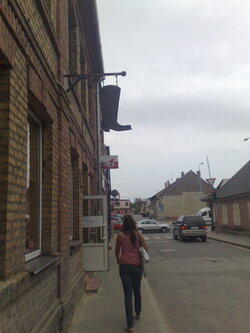Today the Baltic countries are facing the downside of their new market economy. Democracy was not used to build a broad viable welfare society. On the contrary the Baltic states have during the last 18 years followed an ultra capitalistic path which brought quick fortunes to the few, a better life for the young and successful ones and a pretty difficult life for the many social losers. Social gaps emerged as soon as the Soviet flag was lowered. So did the gap between the regions. There has been an exodus from many smaller towns and settlements during the last two decades. Only the major cities managed to keep up the population. All countries have exported labor to the west and the big issue is if these people will return back or if they will stay away for a long time. The Baltics have among the highest unemployment rates i Europe (15-17 %) for June 2009.
Latvia seems to be the worst case according to statistics and news headlines. Even small Estonia is considering to give a 100 million euro loan to it's neighbor Latvia. Latvian hospitals will run out of money by the end of September or the beginning of October if the budget funding is not increased, warns Health Minister Baiba Rozentale, according to the Baltic Times.
The judicial system has obviously not been without faults. However, some embarrassing stories are now brought up to the surface by the state investigators in Latvia. That can give a ray of hope for the future. The brutal truth which is discovered now is that some few enriched themselves illegally. At the same time as salaries and pensions were cut, a 45 million euro money laundry scandal is revealed. State Revenue Service uncovered what they called the biggest money laundering bust in Latvian history. The SRS has now disclosed just how much was laundered – 30.89 million lats, according to The Baltic Times. The millions were apparently used in fake transactions in Riga, reported the SRS. Financial Police officers also uncovered 57 fake companies which were used by three groups of criminals to launder the millions and withdraw funds.
The Baltic countries are not alone facing severe difficulties. Other EU countries, Ukraine, Russia, etc. are also in trouble and the risk of devaluation is coming closer every day in a range of East European countries. However, it's only a year since the world was talking about the Baltic Tigers and the splendid economical results there. Why did Latvia end up in such a situation? Is it random or could it have been avoided ? Bad governance, greed, corruption and crime are more likely the reasons rather than bad luck. Under the surface there have been many indications of bad governance, corruption and crime. An appropriate taxation system was never in place or reminded about a Swiss cheese. Is it also so that while the EU tax payers money were flooding in and boosted the Baltic economy then people with low ethical standards and easy access grabbed the opportunity to tap from the cash stream ? For how long will the EU and the IMF support the Baltic states if there is no radical improvements in the governance ? On the other hand, what is the alternative ? EU can't possibly allow the economy of the Baltic states to go down the drain.
The ultimate question now is when it will change ? And how it will change ? Will citizens with education and international network simply escape the Baltic countries, which is already predicted a significant decrease the next decades ? Or will there be a change in governance which can restore faith, create new jobs and increase population ?
Gloomy days in the Baltic countries
Facing the other side of the capitalist medallion
Lithuanian parliament decided last week to increase the VAT with 2% to 21%. The national economy is expected to contract with 15-20 % this year according to Finance Minister Ingrida Simonyte. Prime Minister Valdis Dombrovskis in Latvia expected in June an 18 % contraction in the Latvian economy. A new 200 mill.euro IMF package has just been settled to ease the pains within the ailing economy. Latvian hospitals are almost out of money. Estonian MP's are fighting over a 2% recently decided raise in VAT. Dark clouds are hanging over the 7 million Baltic heads this summer.
Updated: 03. August 2009

